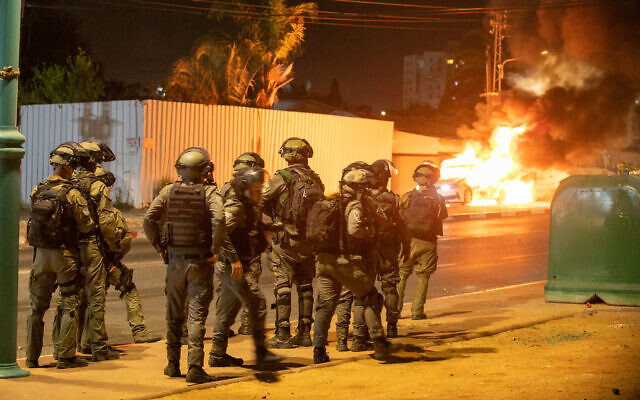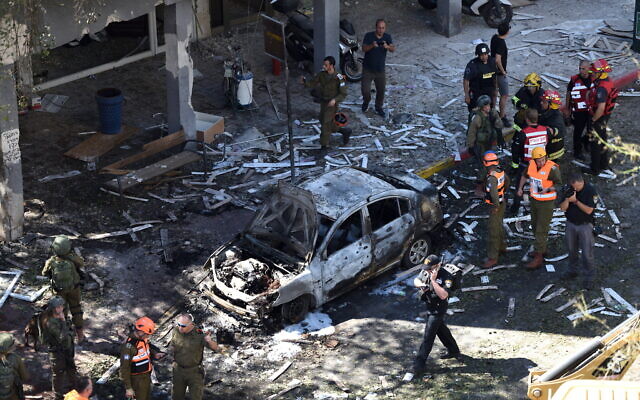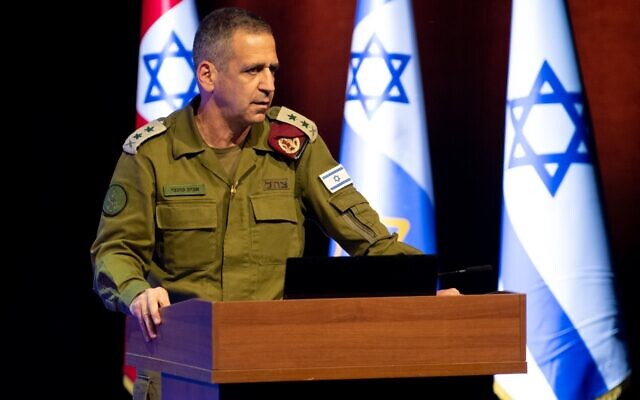Israeli mayors, emergency and security officials, professors and journalists gathered Sunday to discuss the country’s readiness for a major emergency, such as war or a devastating earthquake.
But the atmosphere was pessimistic, with many of the participants repeating the belief that Israel is not ready to handle a large-scale crisis.
“We need to be ready to say we are not ready,” Haifa Mayor Einat Kalisch Rotem told the conference in Modiin.
“In a major earthquake, I’d guess that half the medical staff won’t show up. People will search for their loved ones. So there’s a lot more we need to work on,” said Prof. Chezy Levy, director of Barzilai Medical Center in Ashkelon. The southern coastal city faced hundreds of rocket attacks during fighting with Gaza-based terror groups in the Gaza Strip last May, more than any other city.
Last year’s conflict also saw fiery sectarian violence erupt in many Arab towns and so-called “mixed” cities, which have significant numbers of both Arabs and Jews.
Get The Times of Israel's Daily Edition by email and never miss our top stories
“We are not prepared to give a comprehensive response in the next Guardian of the Walls,” said Deputy Commissioner Sigal Bar Zvi, head of the Israel Police’s Operations Division, using the official name for the 11-day war.

File: Police are seen in Lod during ethnic rioting in the mixed Jewish-Arab city in central Israel, May 12, 2021. (Yossi Aloni/Flash90)
“We will not be able to respond to the full extent of such an event with the resources we have. Guardian of the Walls was a watershed moment, and we are not in a place that can give a real response,” she added.
Opening the conference, the head of the military’s Home Front Command, warned Israeli citizens to brace for the next war.
“Israel’s reality has dramatically changed in the past three years. On one hand, the COVID-19 pandemic burst into our lives in 2020, and on the other hand, during the pandemic, Hamas launched more than 4,400 rockets toward Israeli citizens,” Maj. Gen. Uri Gordin said.
“The bad news is that in the next war — the third Lebanon war or the first northern war, whatever we call it — tens of thousands of rockets will be launched toward Israeli homes,” he added. “Thousands of rockets and missiles every day, at Israeli cities, over the entire length and width of the country.”
But the head of the IDF’s Operations Directorate said the situation would be far worse for Lebanese citizens.
“In a war scenario in the northern theater, it is better to be in Tel Aviv than in Beirut,” Maj. Gen. Oded Basiuk said.

Police and rescue personnel at the scene of a rocket strike in Ramat Gan that killed Gershon Franco, 50, on May 15, 2021 (Gili Yaari /Flash90)
“It is true that in the war things will happen that will make it difficult for the home front, but the resilience of the home front is extremely important to enable the IDF to carry out what it is preparing for, and it is difficult to imagine what will happen in Lebanon,” he said.
In concluding remarks, IDF Chief of Staff Aviv Kohavi issued a harsh warning to Lebanese citizens.
“We are on one hand going to strike with immense power, and on the other hand we will explicitly give them the warning and let them leave,” he said.
“I say from here, to the citizens of Lebanon, first and foremost, not only do I recommend you leave from when the war begins, I recommend you leave from the moment tensions begin, before the first shot is fired, because the power of our attacks will be something you have never seen,” he added.
Kohavi’s comments came after the Lebanese Hezbollah terror group’s leader threatened Israel on Thursday over plans to extract gas from a contested offshore reserve, saying that his organization is capable of preventing such action, including by force.

IDF chief Lt. Gen. Aviv Kohavi speaks during a conference in the central city of Modi’in, July 12, 2022. (Israel Defense Forces)
Last week, Israel said it was “prepared to defend” the facility. The Israel Defense Forces has also deployed naval forces to the area, including a sea-borne Iron Dome anti-missile battery, according to the Kan public broadcaster.
Earlier this month, the IDF held a major military exercise in Cyprus, simulating a ground offensive deep inside Lebanon in a potential war against the Iran-backed Hezbollah terror group.
Hezbollah has long represented the IDF’s most significant military threat, with an estimated arsenal of nearly 150,000 rockets and missiles that can reach anywhere in Israel.
The exercise’s main goal was to simulate halting Hezbollah rocket fire on Israel amid a major escalation, through a ground offensive in Lebanon. According to military officials, the only way to achieve such a goal was to be “significantly present” in the areas where attacks are being launched from, keeping the enemy far from the border.
A week before that, the Home Front Command practiced a simulation in which Israeli cities could be bombarded with 1,500 rockets a day, resulting in 80 sites being heavily damaged with some 300 casualties, during a several-day flare-up with Hezbollah.


